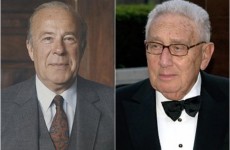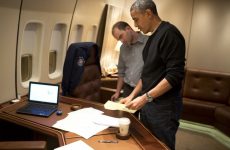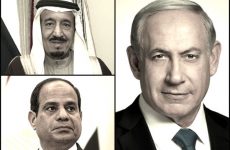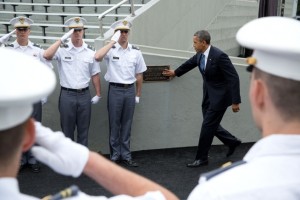
It was highly significant that U.S. President Barack Obama selected West Point as the venue to articulate his foreign and military policy. Without saying it in so many words Obama sent a message loud and clear – America has abdicated its role of ‘policeman of the world’. Obama has jettisoned the projection of American military power that characterized his predecessor George W. Bush. Addressing the graduating cadets, their commander-in-chief told them: “The U.S. will use military force, unilaterally if necessary, when our core interests demand it – when our people are threatened, when our livelihoods are at stake; when the security of our allies is in danger.” But his punch line related to global issues that do not directly threaten the U.S.: “Then the threshold of military action must be much higher. In such circumstances, we should not go it alone. Instead, we must mobilize allies and partners to take collective action.” The truth is this has been a cornerstone of Obama’s policy of ‘leading from behind’ in the Middle East, as exemplified by the crises in Libya and currently in Syria. Clearly, Obama’s refusal to make good on his warning that Assad would face the consequences if he repeated his use of chemical weapons has actually tipped the scales in favor of the regime against the rebels.
‘Houston, we have a problem’?
…after U.S. forces will be withdrawn from those two arenas, Obama has no intention of getting them involved elsewhere.
What impact will this clear-cut approach have on America’s friends and foes in the Middle East? Actually, it hasn’t come as any great surprise. Israel, Saudi Arabia, and the Gulf states, which are also threatened by Iran, as well as Egypt, have been brooding over what they perceive as Obama’s ‘Alice in Wonderland’ policy. If Bush was gung ho to take on Arab jihadists, the U.S. pendulum has now swung the other way. And it’s not just Obama; his views are solidly backed by U.S. public opinion after the loss of so much blood and treasure in Iraq and Afghanistan. And after U.S. forces will be withdrawn from those two arenas, Obama has no intention of getting them involved elsewhere. In his words: “We have been through a long season of war.” His statement was greeted with a loud round of applause by the cadets. “The odds of success are still long and we reserve all options to prevent Iran from obtaining a nuclear weapon. But for the first time in a decade, we have a real chance of achieving a breakthrough agreement; we think that is more effective and durable than what we could have achieved through the use of force.”
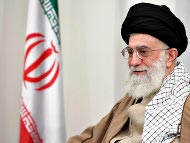
But do all options now include containment and acquiescing to a nuclear Iran? The American intelligence estimate is that it will take a number of years for Tehran to pose a nuclear threat to the U.S. So how are the Iranians likely to interpret Obama’s statement? They have already made it clear that they will not abdicate their capabilities to produce nuclear weapons in the future, although they may have made some concessions on their enriched uranium production. (They have also declared that their development of long-range missiles is not on the table). Make no mistake, they insist on keeping, and even developing, more advanced centrifuges for producing enriched uranium. All they have to do is follow the script of their ally North Korea and give some empty promises about not wanting to produce A-bombs and re-admitting international inspectors.
…there is no mistaking Obama’s optimism about achieving a breakthrough agreement. If the Iranians were not convinced before, they will be now that Obama is locked into a negotiating process…
On the other hand, there is no mistaking Obama’s optimism about achieving a breakthrough agreement. If the Iranians were not convinced before, they will be now that Obama is locked into a negotiating process, and if they play their cards right, they can string him along just enough to preserve their nuclear weapons facilities while the international community will be lulled into a further easing of the sanctions. The U.S. President appears bent on creating a new world order of peaceful coexistence, walking perhaps in the footsteps of Woodrow Wilson after the carnage of World War I. But is it realistic today to confront the onslaught of a militant Islam such as Iran, the Taliban, or Al Qaeda with a lofty vision of ‘diplomacy and development, sanctions and isolation, and appeals to international law’? The real rulers of Iran are not President Hassan Rouhani or Foreign Minister Javad Zarif; they are simply the front men for Supreme Leader Ayatollah Ali Khamenei. And while Obama was making nice to Iran and being reciprocated by Rouhani and Zarif, their boss Khamenei recently castigated Obama before a huge throng that chanted: ‘Death to America’. The other powerful partner in Tehran is the Revolutionary Guards, who may rival Khamenei in power and are participating in Syrian President Bashar Assad’s barbaric war against his own people.
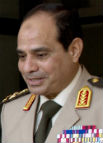
On the positive side, the U.S. attempt to make Egypt safe for democracy has also failed. First, Washington supported the toppling of President Hosni Mubarak, its long time ally in this turbulent part of the world that is being besieged by militant Islam such as al Qaeda, the Taliban, and Iran amid the chorus of American eggheads and pundits who were lauding the prospects of a new democratic regime taking power in Cairo. During the first heady days of the people’s revolution in Freedom Square, Obama sent a former highly regarded ambassador to Cairo to get a firsthand view. He reported back that the Muslim Brothers were the best organized to win a democratic election, but there was only one problem – the organization was a radical Islamic group that would like to turn Egypt into another Afghanistan. Obama and his advisers and most of the American media were so caught up with the democratic drama in Cairo that they refused to heed the warnings. Israel in general and Netanyahu in particular were ridiculed for not getting on the bandwagon. But policy makers in Jerusalem, Riyadh, and America’s other allies in the region looked on in disbelief. Did the CIA and the State Department not grasp what was at stake? Now they are breathing a sigh of relief that Obama has come to his senses and appears ready to accept the new President Abdel Fattah al-Sisi.
During Obama’s first term, Secretary of State Hillary Clinton once spoke of the U.S. providing the Gulf States with a ‘defensive shield’ to protect them from Iran.
What has transpired in Egypt over the past three years is not in keeping with Jeffersonian principles but what was the alternative? Many Middle East countries have no democratic traditions and cannot make the jump from dictatorship to true democracy overnight. Fortunately, the White House and Foggy Bottom now realize that al Sisi is the best option at this time and that injecting democracy into Middle East Arab dictatorships can backfire (as it did in Iran during Jimmy Carter’s term). Saudi Arabia and the Gulf states may try and make their peace with Iran and make the best of a bad situation. During Obama’s first term, Secretary of State Hillary Clinton once spoke of the U.S. providing the Gulf States with a ‘defensive shield’ to protect them from Iran. This may again be in the cards if the U.S. opts for containing a nuclear Iran. But Israel is not laboring under any illusions and will obviously continue to prepare for the day when it may have to go it alone.
Guns or butter…
The Syrian army has been degraded in the ongoing civil war, although Israel has had to build a new defense perimeter along the Syrian border to cope with the threat of attack by al Qaeda and other Jihadists…
The current war of words between Israel’s Ministry of Defense and the Treasury over the defense budget is all the more puzzling in light of the Iranian threat. Aside from Iran, there has been an easing of the threat level facing the Jewish state. Granted, the fear of a Muslim Brotherhood takeover in Egypt, and eventually activating a new and dangerous front, has dissipated with the election of al Sisi. The Syrian army has been degraded in the ongoing civil war, although Israel has had to build a new defense perimeter along the Syrian border to cope with the threat of attack by Al Qaeda and other Jihadists who have infiltrated the rebel camp. Along the Lebanese border, Hezbollah has dispatched forces to Syria to fight for Assad, a move that has aroused sharp criticism and even deadly reprisals inside Lebanon.
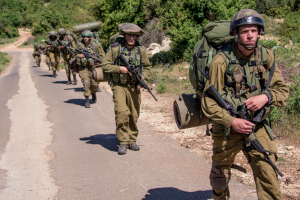
In the face of angry opposition from the defense establishment, starting with Defense Minister Moshe Yaalon, the cabinet decided to slash the defense budget. In response, Chief of Staff Benny Gantz has cancelled three vital activities. First, combat training for reserve ground forces, weekly airtime for reserve pilots and navigators, and he has grounded some air reconnaissance flights all for the lack of budgets. The critics argue that although the IDF has tightened its belt there is still a lot of ‘fat’ that has to be pruned. For example, permanent staff could retire with full pension at the ripe old age of forty-two! Critics including Finance Minister Yair Lapid have accused Yaalon of manipulating public opinion by suspending the vital training programs. Yaalon replies there is no choice and the cabinet must take responsibility for cutting the defense budget in favor of boosting social expenditures. Obviously this is an outrageous situation for a country that must maintain an extremely high level of military preparedness. So, the question is where does the buck stop in Jerusalem? Just where is Prime Minister Bibi Netanyahu amid this verbal free-for-all? Is it not his job, the first among equals in the cabinet, to bang his gavel and get his house (our house) in order?
Warning to U.S. servicemen in Middle East…
In the wake of Sgt. Bowe Bergdahl’s exchange for five Taliban terrorists held at the U.S. base at Guantanamo, the terrorist organization are ecstatic and are undoubtedly planning their own kidnapping operations to free their comrades.
Be on high alert for kidnapping attempts in the region after Washington shifted its previous policy of never negotiating with terrorists in hostage affairs. In the wake of Sgt. Bowe Bergdahl’s exchange for five Taliban terrorists held at the U.S. base at Guantanamo, the terrorist organization are ecstatic and are undoubtedly planning their own kidnapping operations to free their comrades. Israel has long agonized over prisoner exchanges with terrorists, which lets them go unpunished, leads to more kidnapping attempts, and the freed prisoners often return to terrorism. . Latest case in point: Sgt. Gilad Shalit was kidnapped in a Hamas attack from the Gaza Strip, and like Sgt. Bergdahl, was held prisoner for over five years. In order to finally secure his release, Israel freed 1,027 terrorists who were collectively responsible for the murder of 569 Israelis and the wounding of thousands more. The issue was hotly debated in Israel with many relatives of the victims incensed that the killers of their loved ones would not serve out their prison sentences after being tried in court. (Israel does not maintain any secret prisons like Guantanamo, and all those arrested have their day in court).
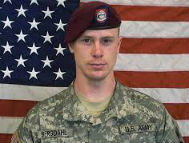
There is also a difference in how Shalit and other IDF POWs were captured and exchanged in the past. Israeli young men and women, except for the ultra-orthodox and Israeli Arabs, are obligated to do compulsory military service. Unlike their American comrades, they have no choice in the matter and do not necessarily decide to choose the military as a job or profession. As such they also assumed the risks voluntarily. But it seems to me that if the country forces its citizens to serve in combat units, it also has a moral obligation to secure their release if they are taken prisoner. Moreover, for every five soldiers, only about one will serve in a combat unit where he or she is most vulnerable to be taken prisoner. (The other four serve in the necessary auxiliary units). Therefore, only a small proportion of soldiers are in real danger of being abducted. In any case, IDF soldiers are repeatedly warned by their commanders to be on top alert when in uniform and when leaving or arriving at their bases.
Pope Francis makes Zionism kosher…
Did Pope Francis give his official stamp of approval to Zionism when he placed a wreath on the tomb of Theodore Herzl, the founder of the Zionist movement?
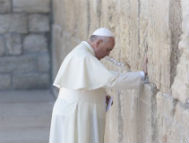
Did Pope Francis give his official stamp of approval to Zionism when he placed a wreath on the tomb of Theodore Herzl, the founder of the Zionist movement? The fact is that three former popes visited Israel’s capital and did not do so. Other than that, he was the perfect diplomat balancing his visit to Israel’s security barrier that prevents Palestinian terrorists from entering Israel with that of a visit to a monument for the Israelis who have been murdered by Palestinian terrorists. If it had not been for these killings, Israel would never have built the security barrier in the first place. (First the Palestinians launched waves of suicide bombers who blew hundreds of Israeli civilians to smithereens, and then they complain when Israel erected a security fence, which has proved very effective). Pope Francis came across as a warm and decent religious leader. This was apparent at his moving meeting with Holocaust survivors when he kissed their hands. His appeal for peace between Israelis and Palestinians was also a sincere gesture as evidenced by his invitation to President Shimon Peres and Palestinian President Mahmoud Abbas to visit him in the Vatican for a peace parley.


